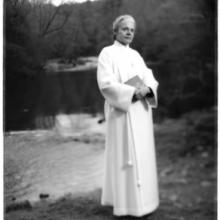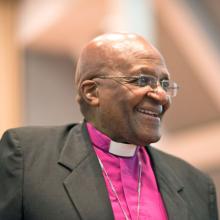Virginia Theological Seminary
With her gray hair tied neatly in a bun and her wire-rimmed glasses perched thoughtfully on her nose, Ellen Davis looks the part of a distinguished Bible scholar.
Her resume certainly reads like one – a Ph.D. from Yale University and teaching appointments at Union Theological Seminary, Virginia Theological Seminary, Yale, and now Duke Divinity School.
Yet despite the traditional cast, Davis is leading a quiet revolution. For the past 20 years, she has been at the vanguard of theologians studying the biblical understanding of care for the land.
Engaging in international travel to participate in political justice — especially anti-apartheid issues in the Mid East and Africa — is a bit like playing big league baseball. The “player” must submit to an excellent coach, pick a good team, learn the essential rules about foreswearing violence, not getting caught stealing by the opposition, and arrive home safely with limited physical or psychic injury.
One of the “hall of fame” coaches still is Archbishop Emeritus Desmond Tutu who wisely said, “if we had taken up arms when things appeared hopeless in our struggle against apartheid in South Africa we would all be dead and apartheid would still exist.”
The Archbishop was in town last week for a CBS webcast interview along with American Episcopal Presiding Bishop Katherine Jefferts Schori on the “Mission of the Church.” He reinforced that “mission is about receiving the love of God in Jesus and then going to the world to make love incarnate” rather than trying to resolve the world’s terrible conflicts with military interventions.
I feel very honored to be invited by this class to give this commencement address, and I asked about the make-up of your class. Most of you, I am told, are going right into the church, or are already there— to ordained ministry and other missions of the church.
So I want to speak directly to you about the vocation of the church in the world. Let me start with a baseball story. I have been a little league baseball coach for both my sons' teams over many years. And I’ve learned that baseball teaches us “lessons of life.”
Just a few weeks ago, our 9-year-old's team was down 5-0, and we had already lost our opening couple of games. It didn’t look good. But all of a sudden, our bats and our team came alive; and all the practice and preparation we had done suddenly showed itself. Best of all, our rally started in the bottom half of the order with our weakest hitters. Two kids got on with walks and our least experienced player went up to the plate. With international parents, Stefan had never played baseball before and you can tell he doesn’t have a clue. But somehow he hit the ball; it went into the outfield. Our first two runs scored and he ended up on second base. Being from a British Commonwealth culture, he began to walk over to the short stop and second baseman and shake their hands! “Stefan,” I shouted, “You have to stay on the base!” “Oh,” he said, “I’ve never been here before.”


